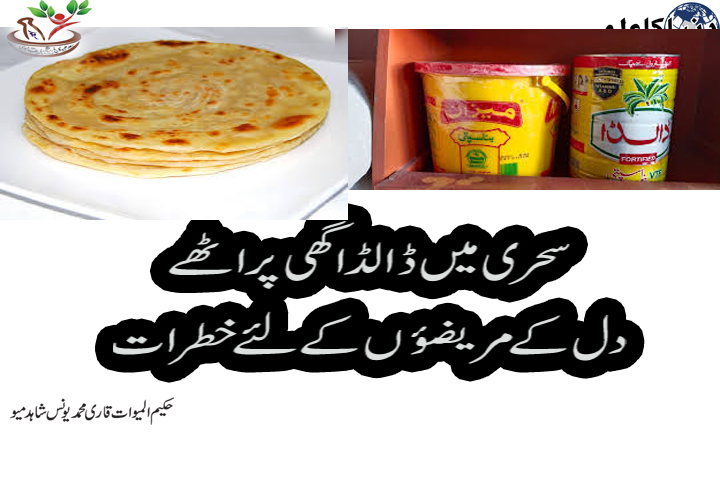- Home
- Hakeem Qari Younas حکیم قاری محمد یونس شاہد میو
- Dalda Ghee Paratha for Sehri

Dalda Ghee Paratha for Sehri
Risks for heart patients

From Hakeem Al Miwat Qari Muhammad Younis Shahid Mayo.
As a result of the observations in the medical world, it can be said that Dalda Ghee has the biggest hand in increasing the incidence of heart disease. Dalda Ghee is playing a major role in the heart diseases in high quantity of Dalda Ghee in the kitchen.
People who use dalda a lot especially eat dalda ghee parathas in Suhoor. They very soon suffer from symptoms like nervous cough, phlegm and runny nose. It has become difficult to determine the direction. We use a lot of ghee in the kitchen. We eat tarbatar padatha in the morning. In the case of cough or cold, we take medicine. In the evening, we eat pilaf fried in the same ghee. They are starting to end their lives with their own hands in a sincere way. These habits of ours are giving chronic disease as a gift. Dry bread with Dalda ghee is a thousand degrees better and useful for health.
Adverse effects of Dalda ghee on human body
Dalda Ghee: A Risky Choice for Heart Health and Beyond
Dalda ghee, a variant of Vanaspati ghee, has been a staple in some kitchens for decades. However, its popularity is overshadowed by its potential health risks. Here’s a deep dive into why dalda ghee may not be a healthy choice for your cooking oil:
Trans-Fats: The Arch-Villain:
The main culprit behind Dalda ghee’s negative health effects is its high content of trans fats. These artificial fats, which are made to solidify liquid oils during the hydrogenation process, wreak havoc on your cholesterol profile. They:
Raise LDL (“bad”) cholesterol: LDL cholesterol is the sticky type that collects on artery walls and forms plaque. This buildup narrows the arteries, restricts blood flow and significantly increases the risk of heart attack and stroke.
Eliminate HDL (“good”) cholesterol: HDL cholesterol acts like a scavenger, removing LDL cholesterol from your arteries and returning it to the liver for elimination. . Trans fats disrupt this process, lowering HDL levels and reducing its protective effects.
This unbalanced cholesterol profile sets the stage for atherosclerosis, a major risk factor for heart disease.
Beyond the Heart: A Cascade of Health Concerns.
Although heart disease is the most worrisome consequence, the trans fats in Dalda ghee can lead to other health problems as well:
Chronic inflammation: Trans fats promote a low-grade inflammatory state throughout the body. This chronic inflammatory response is linked to a variety of health problems, including heart disease, type 2 diabetes, and even certain cancers.
Insulin resistance: High trans and saturated fat intake can impair your body’s ability to use insulin effectively. Insulin is an important hormone for regulating blood sugar levels. When cells become resistant to insulin, your blood sugar can rise, potentially leading to prediabetes and eventually type 2 diabetes.
Weight gain: Dalda ghee packs a heavy calorie punch. Excessive consumption can lead to weight gain and obesity, which increases the risk of chronic diseases such as heart disease and diabetes.
It is important to recognize that most of the research on the health effects of Vanaspati ghee comes from observational studies. However, current evidence points to clear risks associated with trans fat intake. Additionally, several well-established studies on trans fats from other sources (such as commercially processed foods) reinforce concerns about their harmful effects on health.
A healthy alternative to a gourmet kitchen
Thankfully, you don’t have to sacrifice taste for heart health. Many cooking oils are not only delicious but also promote cardiovascular health. Here are some of the best changes:
Olive oil: A staple of the Mediterranean, olive oil is rich in monounsaturated fats, which help improve HDL (“good”) cholesterol levels and lower LDL (“bad”) cholesterol. is known for. It also has anti-inflammatory properties.
Canola Oil: A versatile and affordable option, canola oil is low in saturated fat and free of trans fats. Its neutral flavor makes it suitable for a variety of cooking methods.
Avocado Oil: This advanced oil boasts a high smoke point, making it ideal for high-heat cooking such as stir-frying. It is rich in monounsaturated fat and offers a subtle, nutty flavor.
By incorporating these healthy oils into your cooking routine, you can enhance the flavor of your dishes while contributing to your long-term health.
Last words:
The convenience and familiarity of dalda ghee should not overshadow its potential health risks. Choosing cooking oils rich in unsaturated fats is a wise investment in your well-being. If you have concerns about your current fat intake or an underlying health condition, consulting with a doctor or registered dietitian can help you create a personalized plan for a heart-healthy diet.













